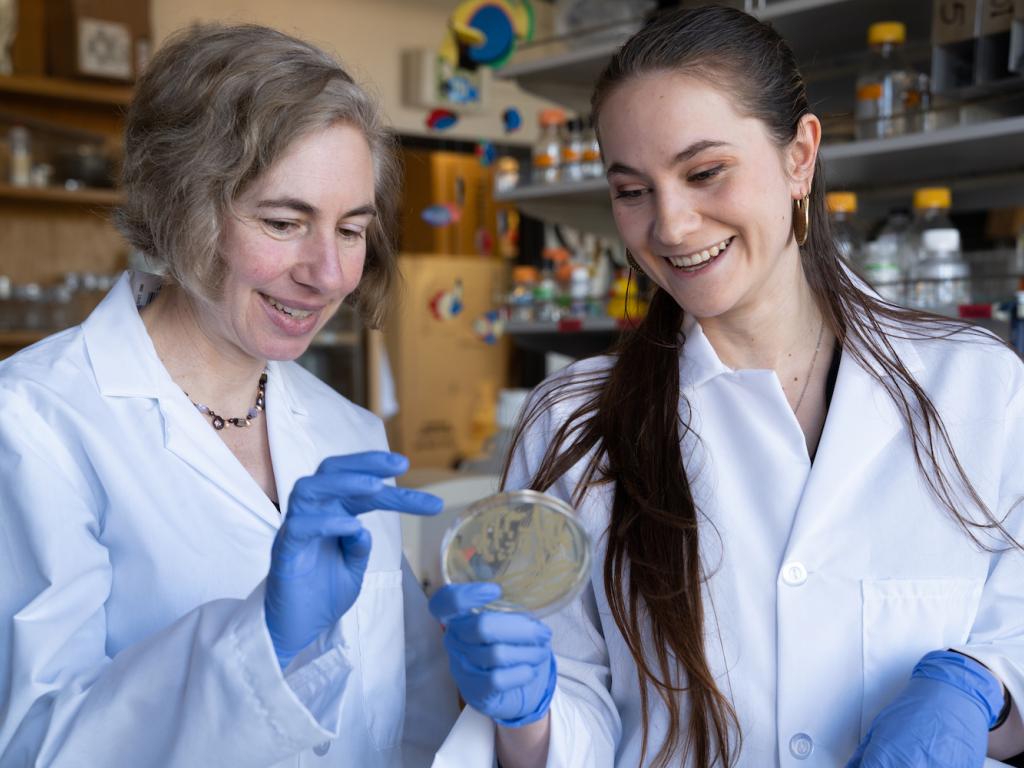
In this Q&A with educational psychologist Jenefer Husman, we asked what comprises a fruitful undergraduate research experience, why motivation and imagining one’s future self are crucial to success, and what programs the University of Oregon offers to provide training in the art and science of research.
The Components of a Successful Undergraduate Research Experience
Office of the Vice President for Research and Innovation (OVPRI): More than 70 percent of the UO’s undergraduates do some kind of research during their time here. But what experience includes is not a one-size fits all experience. Some students find themselves emptying buckets of fruit flies. Others are listed as paper authors. It’s clear not all undergraduate research experiences are created equal. What makes for an engaging and beneficial undergraduate research experience?

Jenefer Husman (JH): Lab groups are human systems, which means they can be just as problematic as other human systems—or just as successful.
Undergraduates come into a lab without prior knowledge of how to do research. They are also often unaware that science is a community, collaborative project. Some of what they need to learn is socialization into the research community, in terms of disciplinary knowledge and jargon, but also what are the norms of that lab environment. Socialization in addition to content knowledge.
It's important for undergraduates to have a mentor who makes the implicit things explicit. There is a lot of research that students leave the sciences often because of very poor mentorship. For our flagship research training programs, the MaSTERIt Noyce scholarship program and the Knight Campus Graduate Internship Program (these programs are discussed in greater depth below), we select the labs very carefully so that there are grad students who will support the undergraduate students in both socialization and making sure the labs are healthy places. We also place undergraduates in labs in pairs so there is a supportive peer.
OVPRI: Beyond mentorship, what else do students need to learn as they develop as researchers or future teachers?
JH: It’s important to learn that failure is a core part of the research process. You don’t know how to do things at the beginning and that’s how you learn. We want to push ourselves because the difficult problems are the important ones. Science faculty and students may not realize that the difference between being a novice and an expert is not brilliance; rather it is having opportunities to spend time to developing knowledge and skills as well as an acceptance that failure is part of the process. Many scientists and engineers believe that you need to be brilliant to be successful, which can be really toxic and is tied to a lack of inclusion.
At a previous institution, we joked about the concept of “engineering disease” – that you must know all the answers even though the engineering process is to deliberately push systems or objects to failure to make sure in the real world they don’t fail. The idea that failure is OK in the science, but not as part of the learning process breeds impostor syndrome and a lack of inclusion. Brilliance really isn’t a thing and its learning that is important. We look for labs where the faculty normalize failing and improving from there.
OVPRI: You’ve talked a lot about facilitating a positive undergraduate research experience. But how can the students prepare themselves to get the most out of their experience? What skills are needed to accept mentorship?
JH: Good question. Accepting correction and a willingness to be wrong, asking for help and direction are all beneficial. Learning to be a partner in developing a collaborative relationship and learning to adhere to certain standards, such as showing up on time, but also asking for timelines and deadlines.
Great Expectations
OVPRI: Willingness to fail, understanding the social context of labs, being open to mentoring. What else do students need to succeed?
JH: My area of research is motivation — how students derive value, particularly their understanding of their futures, and how that influences what they choose to do and the effort they put into the present. One of the things that determines whether we are motivated is our expectation that we will succeed and the value we place on what we’re doing.
Newbie students and scholars don’t yet have an identity as scientists, but they may have the identity of “future scientist.” The value of future thinking is that it keeps open the opportunities for more flexible explorations of our identities.
If you are engaging in a difficult problem, which happens frequently in the sciences, the work feels important. But when something is difficult, the confidence that you will succeed in finding an answer comes into play. If you repeatedly encounter failure, your expectations go down, and you risk disengaging from the work. This is when it’s crucial that we have an identity to hold us in place—your identity roots you in the belief that even though you’re working through a difficult problem, it is still worth your time and frustration and effort.
OVPRI: So, ensuring students have a research experience in a lab and have the opportunity to build an identity as a scientist is the bottom line?
JH: Learning to do research means learning more than just procedures like using a Bunsen burner or designing a circuit. Learning to do research means learning how to develop research questions. Students need context to understand the utility of what they are doing in the research process and how to contribute to new knowledge. We do a disservice to students when a lab experience is only replicating what’s been done before. Students need to see how the parts of the process fit the larger whole.
For example, when students are asked to explain the research process to people outside of the lab, not only do they learn it better, but they can also convince themselves these things are important. Teaching someone else is one of the best ways to learn.
Training Researchers to Research and Teachers to Teach
OVPRI: The UO has several programs focused on training future scientists, or future teachers who are studying in the sciences. Why are training programs like these important?
JH: The first is the Noyce network, the sole purpose of which is to recruit and train science and math teachers. Run by Bryan Rebar, associate director of STEM Core, the program provides science and math majors with a paid, scaffolded research experience over the summer between their junior and senior years, a $10,000 senior year scholarship, and a $22,000 scholarship to complete the UOTeach Masters program (the College of Education’s teacher licensure program). In the UOTeach program students learn about pedagogy, inclusive classroom management, and of culturally informed teaching. This structure connects what they’ve learned doing bench science with the teaching of science.
The students engage in research to become people who are interested in the importance of failure as part of the process of learning, who embrace the idea of how cool it is to not know something, then merely ask a question and know that thing. That process creates motivation—a joy in understanding what real science is. But the lab experience won’t necessarily inform their ability to do inclusive teaching; that’s what UO Teach is for.
The Knight Campus Graduate Internship Program is comprised of two-to-three academic terms of core coursework and electives, with the remainder of the degree requirements with a 9-month paid internship. Students in the program learn technical expertise, hands-on experience, and professional skills (including communication, leadership, and teamwork).
But beyond these two programs, STEM CORE leads, contributes to, and collaborates with a variety of STEM programs.
It’s important to remember that there is no science pipeline—the profession is a highway. There are on ramps, off ramps, and parallel lanes. We need the identities of our scientists and our teachers to be fluid enough they don’t close off possibilities.
